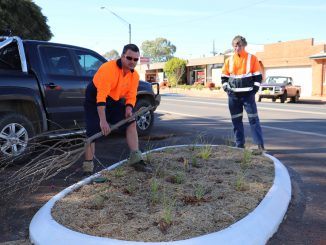
Chair of the Cobar Liquor Accord and long time Cobar resident Linda Carter addressed last week’s council meeting about the damaging effects of mine work rosters on the local community.
“Because of these rosters and the FIFO and DIDO [fly in/fly out and drive in/drive out] workers, we no longer have families living in the town as the workers are actually given incentives not to live locally with their families,” Mrs Carter told the meeting.
“The seven days on/seven days off or two weeks on/two weeks off rosters do nothing but damage to the town.
“It gives no incentive to live here; it has a negative impact on some marriages, relationships and family life.
“And I’m still to be convinced that it doesn’t have a negative impact on a person’s physical and mental wellbeing,” Mrs Carter, who is also an ex-nurse of 38 years experience, said.
“A person cannot function at their best after 12 hours, seven days plus whatever you try and fit in in between your waking hours.
“The flow on effect from this is less kids in all three schools, sporting groups unable to get enough kids or adults to have teams, less businesses willing to either stay or come to Cobar and less professionals willing to relocate to Cobar – teachers, doctors, police, nurses to name a few.”
Mrs Carter said the matter had been discussed at a recent liquor accord meeting and it was suggested that the topic be raised in council so that council might lobby the government and mining companies to take into consideration the detrimental effects of these work rosters on the community.
“All the business I have spoken to and certainly the licenced premises have felt the effects these antisocial work rosters are having on our town,” Mrs Carter said.
“Previously mines have paid relocation cost to get workers to Cobar, gave them incentives to buy their own homes and actually supported a family-friendly town.
“Now they pay for their accommodation, bring their food supply in to town, pay their travel costs to get to Cobar and their cost to get back home.
“Where is this helping Cobar?” she asked.
Mrs Carter quoted examples of the damage comparable mining rosters had done to similar mining towns in Queensland, Northern Territory and Western Australia.
“I ask that Cobar Shire councillors do what is best for the town of Cobar and lobby the government and mining companies to have at the very least 50 per cent of their workforce as local/residential workers.”
Mrs Carter said she understands that some qualifications may need to be sourced outside the area.
She called for the government and mines to provide incentives for workers to live and bring their families to Cobar to live.
“I have seen the decline in the amount of people living, shopping and supporting the town of Cobar and if we let it continue we may as well all leave as there will be nothing left of the town,” she said.
Mrs Carter suggested that Cobar Shire should also plan for the future so that the town is not reliant on mining.
She recommended tapping into the tourist market as well as the RV (recreational vehicle) travellers as she believes that could help support the town beyond mining.
“All business are suffering in Cobar; these are the people supporting the town so how about you show them some support by doing what you have to do to make Cobar what it can be,” Mrs Carter said.

